#dc fables
Text

HOLY SHIT WHAT???
edit: because Bill is a huge piece of shit and heads up for others
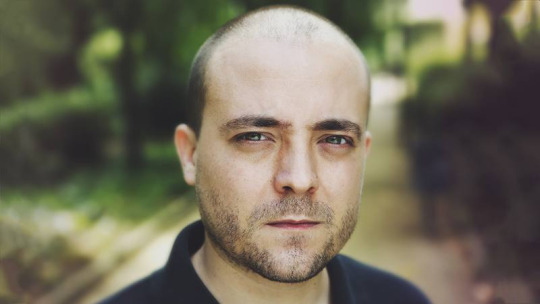
82K notes
·
View notes
Text

(Source)
WOW
This I think is unprecedented, holy shit. All the original characters from Fables and its spinoffs are public domain now!!
763 notes
·
View notes
Text
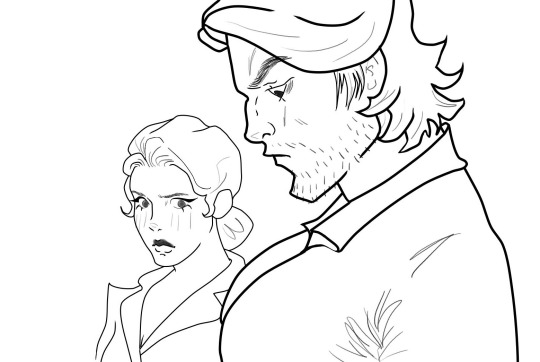
big B(oob)y wolf
#twau#the wolf among us#bigby wolf#snow white#dc fables#snowby#fanart#shitpost#mari's art fart#my hope is that s2 will have a qte dedicated just for motorboating bigbys tig ol bitties
245 notes
·
View notes
Text
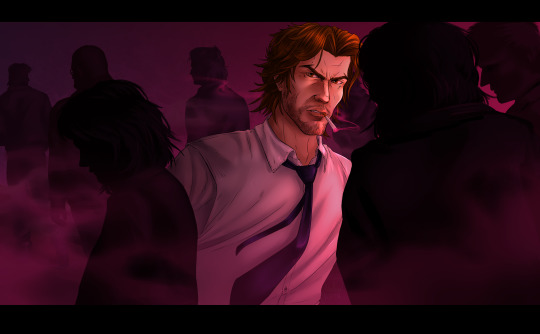
Can't believe it's literally been 10 years since The wolf among us came out... shout out to this game for being one of my all time favourite actually!
I'll wait patiently for the second issue (but with all the stuff happening.. I guess I'll have to wait even longer now)
This drawing is inspired by the menu of the game actually :0 !!
Anyway...I'm sorry for the quality as it was really rushed out ... I'm like 100% focused on uni once more and it's hard to find the time to just sit down and draw maybe it'll get easier in a month or two !
Appart from that, I genuinely wished I made a better drawing but yeah ...
Maybe next year !!
#digital art#digital illustration#artists on tumblr#painting#illustration#my art#twau#twau bigby#the wolf among us#fables comic#bigby wolf#wolf among us#dc fables
16 notes
·
View notes
Text
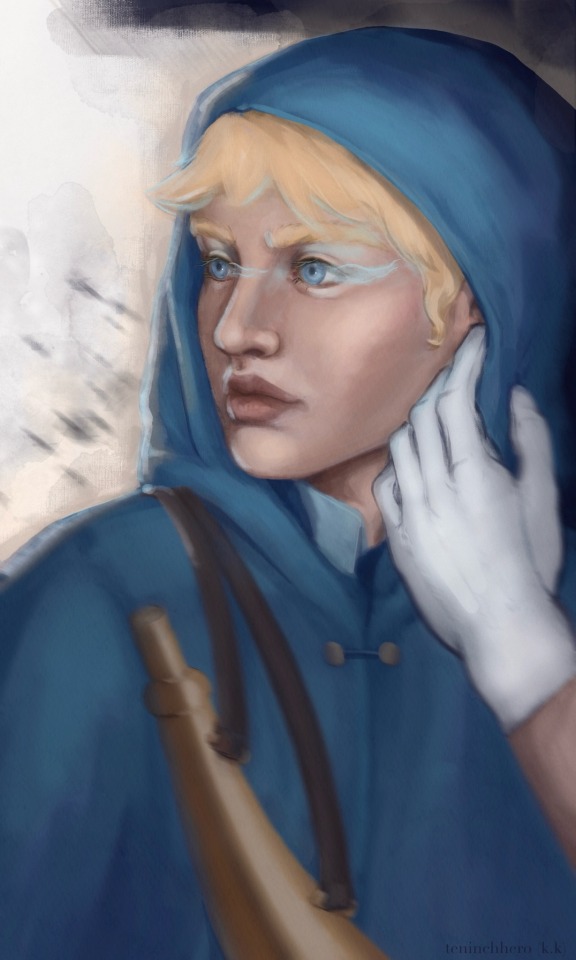
he was my first comic’ love 🤲🏼
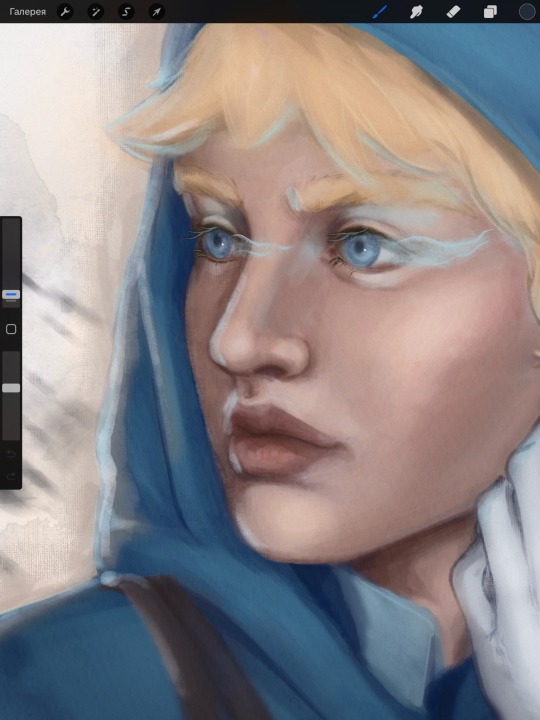

#boy blue#fables#fables comics#fables comic#fables bigby#fables boy blue#twau#the wolf among us#fanart#teninchherofanart#dc fables#snow white
10 notes
·
View notes
Text
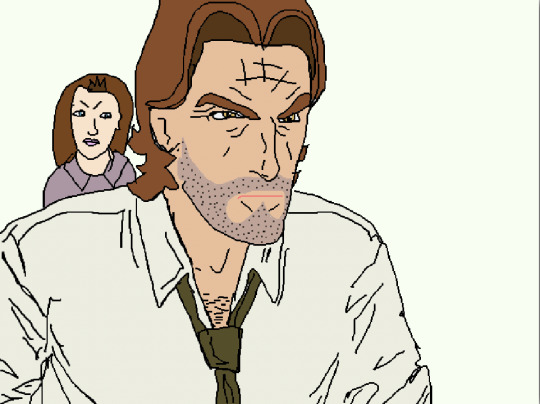
Keira couldn't believe this
Keira: That is the stupidest thing I heard,
Bigby: I know even a mundy doesn't do something like that. Get your eyes tested Crane. It's old news. I don't know what's worse, you doing those marks like student work or those fanfics. I would rather say it's both.
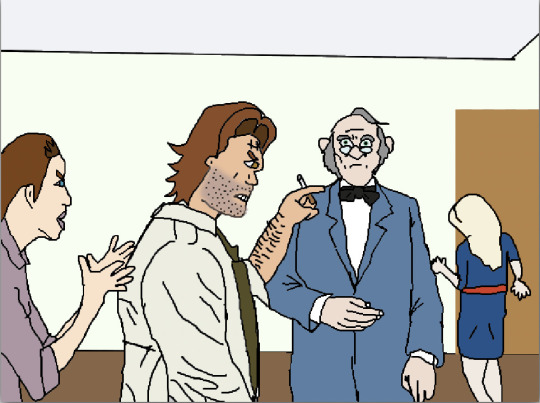
Keira was mad about those fanfics and marking her letters as if it was schoolwork, not that, but she couldn't hold her anger any more.
Keira: I can't believe you, Crane. You still have a crush on me, even when I told you I don't love you. I am so pissed & going to say this one more time and make sure you hear me very clearly. I WILL NEVER EVER GO OUT & I DON'T LOVE YOU. GET THAT YOU M***********.
Both Bigby and Cinderella were shocked to hear Kerry saying something out loud and they knew Keira rarely swears.
Bigby: Calm down Keira, Crane needs to listen to what I need to say.
#story#deputy sheriff#keira swan#twau bigby#the wolf among us#telltale games#fabletown#vertigo comics#the wolf among us bigby#sheriff bigby#swan of fabletown#fables comics#twau 2#twau oc#bigby wolf#fables comic#wolf among us#dc fables#twau bigby wolf#fables bigby wolf#telltale bigby#telltale the wolf among us#bigby telltale#twau telltale#twau#fables bigby#Bigby telltale#deputy#sheriff of fabletown#keira swan twau
8 notes
·
View notes
Text
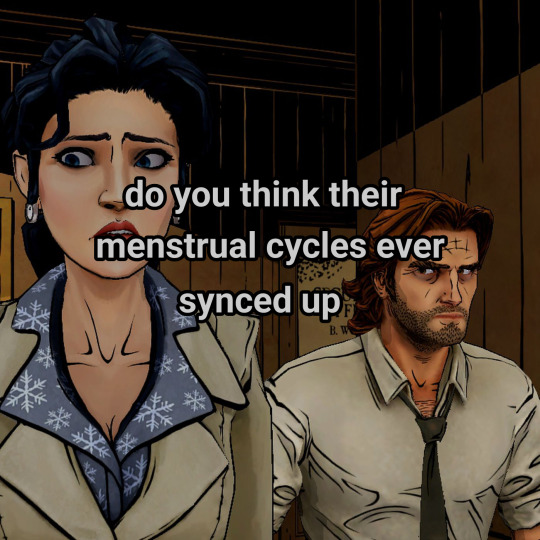
#there was a trend on twitter and it made me think of them <3#twau bigby#twau snow#dc fables#the wolf among us
145 notes
·
View notes
Text
DPXDC Prompt #61 Part 2
Danny knew something was wrong. Jazz wasn’t the type to mess around and Danny knew she wouldn’t ask something like this.
Hanging up the phone Danny thought about his next course of action. Searching up Amity Park got results for some news articles but they were severely lacking headlines about anything ghost related. Another search for his parents this time and they existed but unfortunately they never got the portal working. Great that meant he was trapped in this universe with no easy way back.
Putting his phone away he slowly paced around the rooftop, wondering what steps he could take next. He couldn’t make his way back to Amity Park, he wondered if he could get the portal working but there wasn’t a guarantee they kept the portal in one piece when it didn’t work. He didn’t even know if his stamina could hold the flight back either. He doubted he could find a natural portal, the chance of another spawning nearby was abysmal. He had even left his wallet and keys in his backpack that he left in his locker, there was less chance of Dash stealing from him if he kept nothing of value on him in the first place.
Before Danny had time to make a solid plan the door leading down the stairs burst open and none other than Batman and Robin ran though. Danny had no interest in meeting his father, especially in an alternative universe. They seemed to glance around the roof before they landed on Danny. He only had a couple seconds before Robin ran at him and swung his sword at him. Danny barely dodged before jumping back, getting some distance from Robin.
He took a breath before realizing something, there wasn’t a current Robin in his world. It didn’t make sense, all of the Robins of his world were either retired into a new vigilante name or in the case of Jason Todd, dead. Danny kept up with the Wayne family and the Batfamily, partially because of Sam and Tucker, and partially because of his own curiosity. Sam and Tucker may not have known about Phantom but they were his best friends and he’d do everything to keep them safe.
This current Robin didn’t make any sense, Danny couldn’t make any sense of it. His thoughts caused him to lose focus for a moment and it was all Robin needed as Danny found himself on his back with Robin pointing his sword right at Danny's neck.
It took Danny a moment of staring at the sword until he realized it was his sword. The exact same way he weld back in the League, this WAS him in this universe. Danny couldn’t help but stare, he was a little dumbfounded. How did his counterpart in this world get away from the League? His thoughts were interrupted when Robin started speaking,
“Quiet clone! What does mother want now?” Oh, Danny didn’t like the sound of this.
Danny could admit it was weird hearing the other speak in his voice, “Clone? I’m not a clone.” Danny tried but he could tell Robin wasn’t buying it. Danny could tell Robin narrowed his eyes at him in frustration.
“What do you mean you're not a clone? Except for your eyes you're a carbon copy!” Danny could tell he was getting agitated which might not end well. Danny thought about how to go about this conversation and he decided in the end maybe ripping the bandaid would be the best way to go.
“I’m not a clone!” He repeated scooting a little ways away from the sword, Robin still had it pointed towards him but he didn’t move to attack, good maybe Danny could get some words out. “Alright this is going to sound crazy but I’m from an alternate universe.”
Robin paused like he was listening to something, probably a communication device. Then their Father Batman himself spoke.
“Robin, I need you on backup with Nightwing. I’ll handle things here,” Danny hadn’t ever heard his father speak in person and he felt a little terrified about the conversation he was about to have.
Robin gave him one more glare before heading out and grappling away. Batman approached Danny but stopped a ways away. Danny finally climbed back to his feet before Batman spoke.
“I believe you…” Danny was a little shocked at what he was hearing but he guessed Batman, one of the founders of the Justice League might have encountered some weird stuff in his life.
Batman took a heavy breath before continuing, “ Follow me we can discuss this more once we're back at the cave. I’m sure your version of me is worried sick.”
Danny decided not to say anything on that but followed behind.
The drive to the cave was mundane, Danny was just trying not to think about how difficult the next conversation would be.
Master Post:
Last:
Next:
#dp x dc prompt#danny fenton#danny phantom#dp x dc#dc x dp#poor danny#batman#Danny and Damian have a little fight#Danny's Bruce doesn't even know he has a son#misunderstandings#Danny's never been in the batcave#Everyone is going to be confused#Danny hasn't even told them his name#my asks are open#all my prompts are free to use#I've started job hunting today#Sucks but gotta be done#I'm also thinking about doing youtube#I have such a large backlog of games that we'd never run out of content LMAO#I'd probably start with Bug Fables#I haven't played it at all so it'd be blind#that's enough of my ramblings though
339 notes
·
View notes
Text
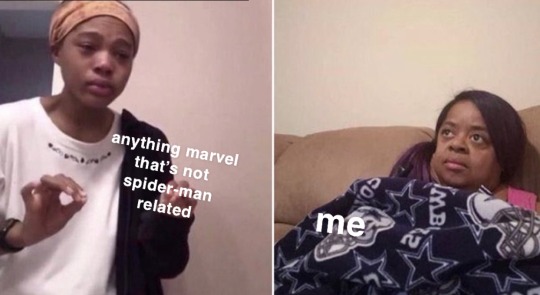
#looked at the word spider for too long now it doesn’t look right#fens fables#atsv#miles morales#spiderverse#wait i made a dc version too
353 notes
·
View notes
Text
hi
jason wasn't close to many other heroes before he died, and most of the ones he was close with told stories about him as a cautionary tale. he became a story filled with half-truths about his life that was passed down to new heroes to tell them about the dangers of being a hero. bruce and dick knew him best but they're emotionally closed off and don't know how to talk about the good things. even cass only knew him as the robin that died for years.
do you think that there are people that didnt think he was real? new heroes that didnt know a lot about batman and robin hearing that there was a robin before the current one that was killed, and they just assume its a made-up story to scare them? when batman and robin became an urban legend, jason did too. he stops being a hero that wanted the best for the people he loved, and instead became a horror story about what happens when you don't listen.
#jason todd#dc#especially because of the 'batman is an urban legend' retcon!!!!!!#batman became an urban legend and jason became a fable#how many heroes just didnt think he was real ?!?!?!?!#anyways. how are you guys doing today
765 notes
·
View notes
Text

Fables Press Release
Subject: Fables Enters the Public Domain
15 September 2023
By Bill Willingham
For Immediate Release
The Lede
As of now, 15 September 2023, the comic book property called Fables, including all related Fables spin-offs and characters, is now in the public domain. What was once wholly owned by Bill Willingham is now owned by everyone, for all time. It’s done, and as most experts will tell you, once done it cannot be undone. Take-backs are neither contemplated nor possible.
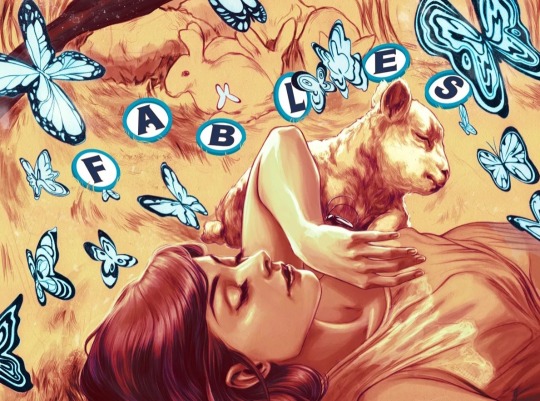
Q: Why Did You Do This?
A number of reasons. I’ve thought this over for some time. In no particular order they are:
1) Practicality: When I first signed my creator-owned publishing contract with DC Comics, the company was run by honest men and women of integrity, who (for the most part) interpreted the details of that agreement fairly and above-board. When problems inevitably came up we worked it out, like reasonable men and women. Since then, over the span of twenty years or so, those people have left or been fired, to be replaced by a revolving door of strangers, of no measurable integrity, who now choose to interpret every facet of our contract in ways that only benefit DC Comics and its owner companies. At one time the Fables properties were in good hands, and now, by virtue of attrition and employee replacement, the Fables properties have fallen into bad hands.
Since I can’t afford to sue DC, to force them to live up to the letter and the spirit of our long-time agreements; since even winning such a suit would take ridiculous amounts of money out of my pocket and years out of my life (I’m 67 years old, and don’t have the years to spare), I’ve decided to take a different approach, and fight them in a different arena, inspired by the principles of asymmetric warfare. The one thing in our contract the DC lawyers can’t contest, or reinterpret to their own benefit, is that I am the sole owner of the intellectual property. I can sell it or give it away to whomever I want.
I chose to give it away to everyone. If I couldn’t prevent Fables from falling into bad hands, at least this is a way I can arrange that it also falls into many good hands. Since I truly believe there are still more good people in the world than bad ones, I count it as a form of victory.
More in the link below:
#fables#public#domain#public domain#dc comics#vertigo#bill willingham#the sandman#free#hero#fight for your right#neil gaiman
307 notes
·
View notes
Text
Imagine being a rampant misogynist and then "gifting" your intellectual property to the public domain under the guise of "keeping it out of the hands of bad people" and then being surprised when people (esp women) assume the crime of those "bad people" was an intention to diversify the story 🤔🤨 I want to see the emails.
#this is abt fables btw.#like ok grown man who wrote one of the worst fridgings in dc history (which is really saying smth) and then said u wanted to shoot#all the women fans upset by it tell me more abt how dc wanted to give writing credit to “bad people.” I'm just curious.#tcp#oh the things we invent
148 notes
·
View notes
Text
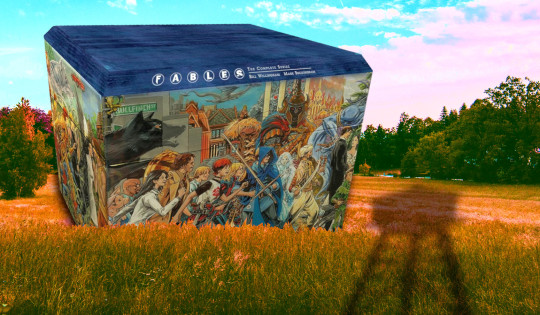
On September 22, I'm (virtually) presenting at the DIG Festival in Modena, Italy. On September 27, I'll be at Chevalier's Books in Los Angeles with Brian Merchant for a joint launch for my new book The Internet Con and his new book, Blood in the Machine.

It's been 21 years since Bill Willingham launched Fables, his 110-issue, wide-ranging, delightful and brilliantly crafted author-owned comic series that imagines that the folkloric figures of the world's fairytales are real people, who live in a secret society whose internal struggles and intersections with the mundane world are the source of endless drama.
Fables is a DC Comics title; DC is division of the massive entertainment conglomerate Warners, which is, in turn, part of the Warner/Discovery empire, a rapacious corporate behemoth whose screenwriters have been on strike for 137 days (and counting). DC is part of a comics duopoly; its rival, Marvel, is a division of the Disney/Fox juggernaut, whose writers are also on strike.
The DC that Willingham bargained with at the turn of the century isn't the DC that he bargains with now. Back then, DC was still subject to a modicum of discipline from competition; its corporate owner's shareholders had not yet acquired today's appetite for meteoric returns on investment of the sort that can only be achieved through wage-theft and price-gouging.
In the years since, DC – like so many other corporations – participated in an orgy of mergers as its sector devoured itself. The collapse of comics into a duopoly owned by studios from an oligopoly had profound implications for the entire sector, from comic shops to comic cons. Monopoly breeds monopoly, and the capture of the entire comics distribution system by a single company – Diamond – was attended by the capture of the entire digital comics market by a single company, Amazon, who enshittified its Comixology division, driving creators and publishers into Kindle Direct Publishing, a gig-work platform that replicates the company's notoriously exploitative labor practices for creative workers. Today, Comixology is a ghost-town, its former employees axed in a mass layoff earlier this year:
https://gizmodo.com/amazon-layoffs-comixology-1850007216
When giant corporations effect these mergers, they do so with a kind of procedural kabuki, insisting that they are dotting every i and crossing every t, creating a new legal entity whose fictional backstory is a perfect, airtight bubble, a canon with not a single continuity bug. This performance of seriousness is belied by the behind-the-scenes chaos that these corporate shifts entail – think of the way that the banks that bought and sold our mortgages in the run-up to the 2008 crisis eventually lost the deeds to our houses, and then just pretended they were legally entitled to collect money from us every month – and steal our houses if we refused to pay:
https://www.reuters.com/article/idINIndia-58325420110720
Or think of the debt collection industry, which maintains a pretense of careful record-keeping as the basis for hounding and threatening people, but which is, in reality, a barely coherent trade in spreadsheets whose claims to our money are matters of faith:
https://pluralistic.net/2023/08/12/do-not-pay/#fair-debt-collection-practices-act
For usury, the chaos is a feature, not a bug. Their corporate strategists take the position that any ambiguity should be automatically resolved in their favor, with the burden of proof on accused debtors, not the debt collectors. The scumbags who lost your deed and stole your house say that it's up to you to prove that you own it. And since you've just been rendered homeless, you don't even have a house to secure a loan you might use to pay a lawyer to go to court.
It's not solely that the usurers want to cheat you – it's that they can make more money if they don't pay for meticulous record-keeping, and if that means that they sometimes cheat us, that's our problem, not theirs.
While this is very obvious in the usury sector, it's also true of other kinds of massive mergers that create unfathomnably vast conglomerates. The "curse of bigness" is real, but who gets cursed is a matter of power, and big companies have a lot more power.
The chaos, in other words, is a feature and not a bug. It provides cover for contract-violating conduct, up to and including wage-theft. Remember when Disney/Marvel stole money from beloved science fiction giant Alan Dean Foster, whose original Star Wars novelization was hugely influential on George Lucas, who changed the movie to match Foster's ideas?
Disney claimed that when it acquired Lucasfilm, it only acquired its assets, but not its liabilities. That meant that while it continued to hold Foster's license to publish his novel, they were not bound by an obligation to pay Foster for this license, since that liability was retained by the (now defunct) original company:
https://pluralistic.net/2022/04/30/disney-still-must-pay/#pay-the-writer
For Disney, this wage-theft (and many others like it, affecting writers with less fame and clout than Foster) was greatly assisted by the chaos of scale. The chimera of Lucas/Disney had no definitive responsible party who could be dragged into a discussion. The endless corporate shuffling that is normal in giant companies meant that anyone who might credibly called to account for the theft could be transfered or laid off overnight, with no obvious successor. The actual paperwork itself was hard for anyone to lay hands on, since the relevant records had been physically transported and re-stored subsequent to the merger. And, of course, the company itself was so big and powerful that it was hard for Foster and his agent to raise a credible threat.
I've experienced versions of this myself: every book contract I've ever signed stipulated that my ebooks could not be published with DRM. But one of my publishers – a boutique press that published my collection Overclocked – collapsed along with most of its competitors, the same week my book was published (its distributor, Publishers Group West, went bankrupt after its parent company, Advanced Marketing Services, imploded in a shower of fraud and criminality).
The publisher was merged with several others, and then several more, and then several more – until it ended up a division of the Big Five publisher Hachette, who repeatedly, "accidentally" pushed my book into retail channels with DRM. I don't think Hachette deliberately set out to screw me over, but the fact that Hachette is (by far) the most doctrinaire proponent of DRM meant that when the chaos of its agglomerated state resulted in my being cheated, it was a happy accident.
(The Hachette story has a happy ending; I took the book back from them and sold it to Blackstone Publishing, who brought out a new expanded edition to accompany a DRM-free audiobook and ebook):
https://www.blackstonepublishing.com/overclocked-bvej.html
Willingham, too, has been affected by the curse of bigness. The DC he bargained with at the outset of Fables made a raft of binding promises to him: he would have approval over artists and covers and formats for new collections, and he would own the "IP" for the series, meaning the copyrights vested in the scripts, storylines, characters (he might also have retained rights to some trademarks).
But as DC grew, it made mistakes. Willingham's hard-fought, unique deal with the publisher was atypical. A giant publisher realizes its efficiencies through standardized processes. Willingham's books didn't fit into that standard process, and so, repeatedly, the publisher broke its promises to him.
At first, Willingham's contacts at the publisher were contrite when he caught them at this. In his press-release on the matter, Willingham calls them "honest men and women of integrity [who] interpreted the details of that agreement fairly and above-board":
https://billwillingham.substack.com/p/willingham-sends-fables-into-the
But as the company grew larger, these counterparties were replaced by corporate cogs who were ever-more-distant from his original, creator-friendly deal. What's more, DC's treatment of its other creators grew shabbier at each turn (a dear friend who has written for DC for decades is still getting the same page-rate as they got in the early 2000s), so Willingham's deal grew more exceptional as time went by. That meant that when Willingham got the "default" treatment, it was progressively farther from what his contract entitled him to.
The company repeatedly – and conveniently – forgot that Willingham had the final say over the destiny of his books. They illegally sublicensed a game adapted from his books, and then, when he objected, tried to make renegotiating his deal a condition of being properly compensated for this theft. Even after he won that fight, the company tried to cheat him and then cover it up by binding him to a nondisclosure agreement.
This was the culmination of a string of wage-thefts in which the company misreported his royalties and had to be dragged into paying him his due. When the company "practically dared" Willingham to sue ("knowing it would be a long and debilitating process") he snapped.
Rather than fight Warner, Willingham has embarked on what JWZ calls an act of "absolute table-flip badassery" – he has announced that Fables will hereafter be in the public domain, available for anyone to adapt commercially, in works that compete with whatever DC might be offering.
Now, this is huge, and it's also shrewd. It's the kind of thing that will bring lots of attention on Warner's fraudulent dealings with its creative workforce, at a moment where the company is losing a public relations battle to the workers picketing in front of its gates. It constitutes a poison pill that is eminently satisfying to contemplate. It's delicious.
But it's also muddy. Willingham has since clarified that his public domain dedication means that the public can't reproduce the existing comics. That's not surprising; while Willingham doesn't say so, it's vanishingly unlikely that he owns the copyrights to the artwork created by other artists (Willingham is also a talented illustrator, but collaborated with a who's-who of comics greats for Fables). He may or may not have control over trademarks, from the Fables wordmark to any trademark interests in the character designs. He certainly doesn't have control over the trademarked logos for Warner and DC that adorn the books.
When Willingham says he is releasing the "IP" to his comic, he is using the phrase in its commercial sense, not its legal sense. When business people speak of "owning IP," they mean that they believe they have the legal right to control the conduct of their competitors, critics and customers:
https://locusmag.com/2020/09/cory-doctorow-ip/
The problem is that this doesn't correspond to the legal concept of IP, because IP isn't actually a legal concept. While there are plenty of "IP lawyers" and even "IP law firms," there is no "IP law." There are many laws that are lumped together under "IP," including the big three (trademark, copyright and patent), but also a bestiary of obscure cousins and subspecies – trade dress, trade secrecy, service marks, noncompetes, nondisclosues, anticirumvention rights, sui generis "neighboring rights" and so on.
The job of an "IP lawyer" is to pluck individual doctrines from this incoherent scrapheap of laws and regulations and weave them together into a spider's web of tripwires that customers and critics and competitors can't avoid, and which confer upon the lawyer's client the right to sue for anything that displeases them.
When Willingham says he's releasing Fables into the public domain, it's not clear what he's releasing – and what is his to release. In the colloquial, business sense of "IP," saying you're "releasing the IP" means something like, "Feel free to create adaptations from this." But these adaptations probably can't draw too closely on the artwork, or the logos. You can probably make novelizations of the comics. Maybe you can make new comics that use the same scripts but different art. You can probably make sequels to, or spinoffs of, the existing comics, provided you come up with your own character designs.
But it's murky. Very murky. Remember, this all started because Willingham didn't have the resources or patience to tangle with the rabid attack-lawyers Warners keeps kenneled on its Burbank lot. Warners can (and may) release those same lawyers on you, even if you are likely to prevail in court, betting that you – like Willingham – won't have the resources to defend yourself.
The strange reality of "IP" rights is that they can be secured without any affirmative step on your part. Copyrights are conjured into existence the instant that a new creative work is fixed in a tangible medium and endure until the creator's has been dead for 70 years. Common-law trademarks gradually come into definition like an image appearing on photo-paper in a chemical soup, growing in definition every time they are used, even if the mark's creator never files a form with the USPTO.
These IP tripwires proliferate in the shadows, wherever doodles are sketched on napkins, wherever kindergartners apply finger-paint to construction-paper. But for all that they are continuously springing into existence, and enduring for a century or more, they are absurdly hard to give away.
This was the key insight behind the Creative Commons project: that while the internet was full of people saying "no copyright" (or just assuming the things they posted were free for others to use), the law was a universe away from their commonsense assumptions. Creative Commons licenses were painstakingly crafted by an army of international IP lawyers who set out to turn the normal IP task on its head – to create a legal document that assured critics, customers and competitors that the licensor had no means to control their conduct.
20 years on, these licenses are pretty robust. The flaws in earlier versions have been discovered and repaired in subsequent revisions. They have been adapted to multiple countries' legal systems, allowing CC users to mix-and-match works from many territories – animating Polish sprites to tell a story by a Canadian, set to music from the UK.
Willingham could clarify his "public domain" dedication by applying a Creative Commons license to Fables, but which license? That's a thorny question. What Willingham really wants here is a sampling license – a license that allows licensees to take some of the elements of his work, combine them with other parts, and make something new.
But no CC license fits that description. Every CC license applies to whole works. If you want to license the bass-line from your song but not the melody, you have to release the bass-line separately and put a CC license on that. You can't just put a CC license on the song with an asterisked footnote that reads "just the bass, though."
CC had a sampling license: the "Sampling Plus 1.0" license. It was a mess. Licensees couldn't figure out what parts of works they were allowed to use, and licensors couldn't figure out how to coney that. It's been "retired."
https://creativecommons.org/licenses/sampling+/1.0/
So maybe Willingham should create his own bespoke license for Fables. That may be what he has to do, in fact. But boy is that a fraught business. Remember the army of top-notch lawyers who created the CC licenses? They missed a crucial bug in the first three versions of the license, and billions of works have been licensed under those earlier versions. This has enabled a mob of crooked copyleft trolls (like Pixsy) to prey on the unwary, raking in a fortune:
https://doctorow.medium.com/a-bug-in-early-creative-commons-licenses-has-enabled-a-new-breed-of-superpredator-5f6360713299
Making a bug-free license is hard. A failure on Willingham's part to correctly enumerate or convey the limitations of such a license – to list which parts of Fables DC might sue you for using – could result in downstream users having their hard work censored out of existence by legal threats. Indeed, that's the best case scenario – defects in a license could result in downstream users, their collaborators, investors, and distributors being sued for millions of dollars, costing them everything they have, up to and including their homes.
Which isn't to say that this is dead on arrival – far from it! Just that there is work to be done. I can't speak for Creative Commons (it's been more than 20 years since I was their EU Director), but I'm positive that there are copyfighting lawyers out there who'd love to work on a project like this.
I think Willingham is onto something here. After all, Fables is built on the public domain. As Willingham writes in his release: "The current laws are a mishmash of unethical backroom deals to keep trademarks and copyrights in the hands of large corporations, who can largely afford to buy the outcomes they want."
Willingham describes how his participation in the entertainment industry has made him more skeptical of IP, not less. He proposes capping copyright at 20 years, with a single, 10-year extension for works that are sold onto third parties. This would be pretty good industrial policy – almost no works are commercially viable after just 14 years:
https://rufuspollock.com/papers/optimal_copyright.pdf
But there are massive structural barriers to realizing such a policy, the biggest being that the US had tied its own hands by insisting that long copyright terms be required in the trade deals it imposed on other countries, thereby binding itself to these farcically long copyright terms.
But there is another policy lever American creators can and should yank on to partially resolve this: Termination. The 1976 Copyright Act established the right for any creator to "terminate" the "transfer" of any copyrighted work after 30 years, by filing papers with the Copyright Office. This process is unduly onerous, and the Authors Alliance (where I'm a volunteer advisor) has created a tool to simplify it:
https://www.authorsalliance.org/resources/rights-reversion-portal/
Termination is deliberately obscure, but it's incredibly powerful. The copyright scholar Rebecca Giblin has studied this extensively, helping to produce the most complete report on how termination has been used by creators of all types:
https://pluralistic.net/2021/10/04/avoidance-is-evasion/#reverted
Writers, musicians and other artists have used termination to unilaterally cancel the crummy deals they had crammed down their throats 30 years ago and either re-sell their works on better terms or make them available directly to the public. Every George Clinton song, every Sweet Valley High novel, and the early works of Steven King have all be terminated and returned to their creators.
Copyright termination should and could be improved. Giblin and I wrote a whole-ass book about this and related subjects, Chokepoint Capitalism, which not only details the scams that writers like Willingham are subject to, but also devotes fully half its length to presenting detailed, technical, shovel-ready proposals for making life better for creators:
https://chokepointcapitalism.com/
Willingham is doing something important here. Larger and larger entertainment firms offer shabbier and shabbier treatment to creative workers, as striking members of the WGA and SAG-AFTRA can attest. Over the past year, I've seen a sharp increase in the presence of absolutely unconscionable clauses in the contracts I'm offered by publishers:
https://pluralistic.net/2022/06/27/reps-and-warranties/#i-agree
I'm six months into negotiating a contract for a 300 word piece I wrote for a magazine I started contributing to in 1992. At issue is that they insist that I assign film rights and patent rights from my work as a condition of publication. Needless to say, there are no patentable inventions nor film ideas in this article, but they refuse to vary the contract, to the obvious chagrin of the editor who commissioned me.
Why won't they grant a variance? Why, they are so large – the magazine is part of a global conglomerate – that it would be impractical for them to track exceptions to this completely fucking batshit clause. In other words: we can't strike this batshit clause because we decided that from now on, all out contracts will have batshit clauses.
The performance of administrative competence – and the tactical deployment of administrative chaos – among giant entertainment companies is grotesque, but every now and again, it backfires.
That's what's happening at Marvel right now. The estates of Marvel founder Stan Lee and its seminal creator Steve Ditko are suing Marvel to terminate the transfer of both creators' characters to Marvel. If they succeed, Marvel will lose most of its most profitable characters, including Iron Man:
https://www.reuters.com/legal/marvel-artists-estate-ask-pre-trial-wins-superhero-copyright-fight-2023-05-22/
They're following in the trail of the Jack Kirby estate, whom Marvel paid millions to rather than taking their chances with the Supreme Court.
Marvel was always an administrative mess, repeatedly going bankrupt. Its deals with its creators were indifferently papered over, and then Marvel lost a lot of the paperwork. I'd bet anything that many of the key documents Disney (Marvel's owner) needs to prevail over Lee and Ditko are either unlocatable or destroyed – or never existed in the first place.
A more muscular termination right – say, one that kicks in after 20 years, and is automatic – would turn circuses like Marvel-Lee/Ditko into real class struggles. Rather than having the heirs of creators reaping the benefit of termination, we could make termination into a system for getting creators themselves paid.
In the meantime, there's Willingham's "absolute table-flip badassery."

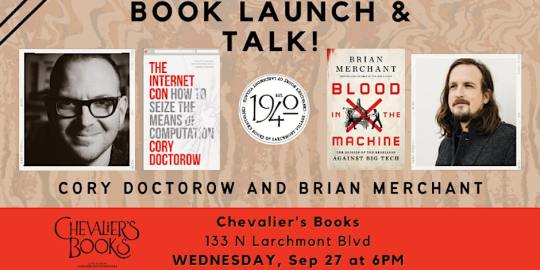

If you'd like an essay-formatted version of this post to read or share, here's a link to it on pluralistic.net, my surveillance-free, ad-free, tracker-free blog:
https://pluralistic.net/2023/09/15/fairy-use-tales/#sampling-license

Image:
Tom Mrazek (modified)
https://commons.wikimedia.org/wiki/File:An_Open_Field_%2827220830251%29.jpg
CC BY 2.0
https://creativecommons.org/licenses/by/2.0/deed.en
--
Penguin Random House (modified)
https://www.penguinrandomhouse.com/books/707161/fables-20th-anniversary-box-set-by-bill-willingham/
Fair use
https://www.eff.org/issues/intellectual-property
#pluralistic#fables#comics#graphic novels#dc#warner#monopoly#publishing#chokepoint capitalism#poison pills#ip#bill willingham#public domain#copyright#copyfight#creative commons#licenses#copyleft trolls
240 notes
·
View notes
Text

snow vision goes crazy
87 notes
·
View notes
Text
Just learned that Bill Willingham, creator of the Fables universe of comics best known from Telltale Games's The Wolf Among Us, has taken what he sees as the only real action to stop DC from just trampling over everything: make his universe public domain.
As a creative, I cannot help but bask in how baller of a move this is. I cannot think of many people who would have done the same, but it rules.

And as it turns out it's something born out of his wider feelings on copyright in general- this is him putting his money (arguably literally) where his mouth is.

I've honestly not read any of Fables and haven't even played The Wolf Among Us, but this is definitely the sort of thing that'd push me to.

163 notes
·
View notes
Text

Lan Medina: Snow White and Bigby
115 notes
·
View notes